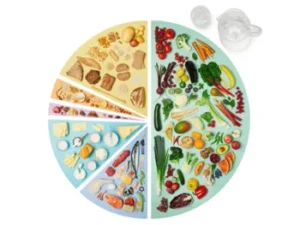Norway is the latest European country to advocate for a plant-forward diet in its national dietary guidelines, though its recommended meat intake remains relatively high, as climate impact isn’t fully considered.
Following in the footsteps of Austria and Germany, which have updated their dietary guidelines to promote predominantly plant-based diets, Norway has reduced its recommended red meat consumption by 30%, from 500g to 350g per week.
Beyond lean meats and fish, the Norwegian Directorate for Health now encourages the inclusion of plant proteins and meat substitutes. They also recommend that processed legume products like vegetarian burgers, sausages, and falafel should be low in salt and fat.Importantly, the directorate notes, “A healthy and varied vegetarian or vegan diet that meets energy needs will also provide sufficient protein.”
The latest dietary guidelines, represent a significant evolution in the country’s approach to public health, sustainability, and food consumption. These guidelines are designed to address modern challenges such as climate change, rising lifestyle diseases, and the need for sustainable food systems. Built on the latest scientific evidence, the new recommendations aim to improve the overall health of Norwegians while also promoting environmentally conscious eating habits.

© Helsenorge/Norwegian Directorate of Health
Key Updates in the New Guidelines
The new Norwegian dietary guidelines reflect a holistic view of diet, integrating both personal health and environmental sustainability.
Below are the key updates:
- More Plant-Based Foods: The guidelines emphasize a shift towards a more plant-based diet. This is not only for health reasons but also to reduce the environmental impact of food production. Norwegians are encouraged to consume more fruits, vegetables, legumes, whole grains, and nuts, while cutting back on animal-based foods. This recommendation aligns with global efforts to reduce greenhouse gas emissions associated with livestock farming.
- Less Red and Processed Meat: One of the significant changes is the reduced emphasis on red and processed meat consumption. These foods have been linked to an increased risk of cancer, cardiovascular diseases, and environmental harm. While meat is not eliminated from the diet, the guidelines suggest limiting its intake to a few times a week, replacing it with fish, poultry, or plant-based protein sources.
- Focus on Whole Foods: Processed and ultra-processed foods, often high in salt, sugar, and unhealthy fats, have been discouraged. Instead, the guidelines promote the consumption of whole, minimally processed foods that are nutrient-dense. This change is expected to reduce the intake of empty calories and help combat obesity and related diseases.
- Healthy Fats and Reduced Sugar Intake: In line with previous recommendations, the new guidelines continue to promote the consumption of healthy fats from sources like fatty fish, nuts, seeds, and vegetable oils. There is also an even stronger push to reduce the intake of added sugars, which are linked to numerous health issues such as obesity, diabetes, and dental problems.
- Sustainable Seafood: Norway, with its rich marine resources, continues to recommend seafood as a healthy and environmentally friendly source of protein and essential fats. However, the new guidelines stress the importance of sourcing sustainable seafood to protect marine ecosystems. This reflects a growing awareness of overfishing and the need to preserve the biodiversity of the oceans.
- Dairy Products in Moderation: While dairy products remain a staple in the Norwegian diet, the guidelines suggest moderate consumption, particularly of low-fat varieties. This shift is partly in response to the growing body of evidence on the potential health risks of excessive saturated fat intake and the environmental concerns associated with dairy farming.
- Water as the Primary Beverage: The new guidelines reinforce water as the go-to beverage, recommending it over sugary drinks and even fruit juices, which can be high in calories and sugars. This advice is consistent with efforts to reduce calorie intake and promote hydration through healthier means.
- Cultural and Social Aspects of Eating: The new guidelines also highlight the importance of the social and cultural aspects of food. They encourage mindful eating practices, the enjoyment of meals in communal settings, and an appreciation for traditional Norwegian foods, all of which contribute to a more balanced and fulfilling diet.
The Sustainability Factor
A key aspect of the new guidelines is the emphasis on sustainability. Norway, like many other nations, is recognizing the role that food production and consumption play in climate change. Agriculture, especially livestock farming, is a significant contributor to greenhouse gas emissions, deforestation, and biodiversity loss. By recommending a plant-forward diet with less meat and more sustainable food choices, Norway aims to reduce the environmental footprint of its citizens.
The guidelines also encourage reducing food waste, buying locally produced foods when possible, and supporting agricultural practices that are less harmful to the environment. This aligns with the broader international movement towards a more sustainable food system, as outlined in the EAT-Lancet Commission’s report on healthy diets from sustainable food systems.
Implementation and Public Response
The Norwegian government, with health and environmental groups, will launch a nationwide campaign to promote the new guidelines. Public health initiatives, school programs, and partnerships with the food industry are key to encouraging widespread adoption.Response has been mostly positive, especially among health experts and environmentalists. However, reducing red meat intake, a cultural staple, presents challenges. Continued education and support will be needed to help people embrace these dietary changes.
Conclusion
Norway’s new nutrition guidelines represent a forward-thinking approach to public health and environmental sustainability. By advocating for a more plant-based diet, reducing the consumption of processed foods, and emphasizing sustainability in food choices, these guidelines are not only focused on improving individual health but also on protecting the planet. As more countries begin to recognise the intersection of diet and sustainability, Norway’s guidelines could serve as a model for others seeking to create healthier, more sustainable food systems.
For more information visit:

